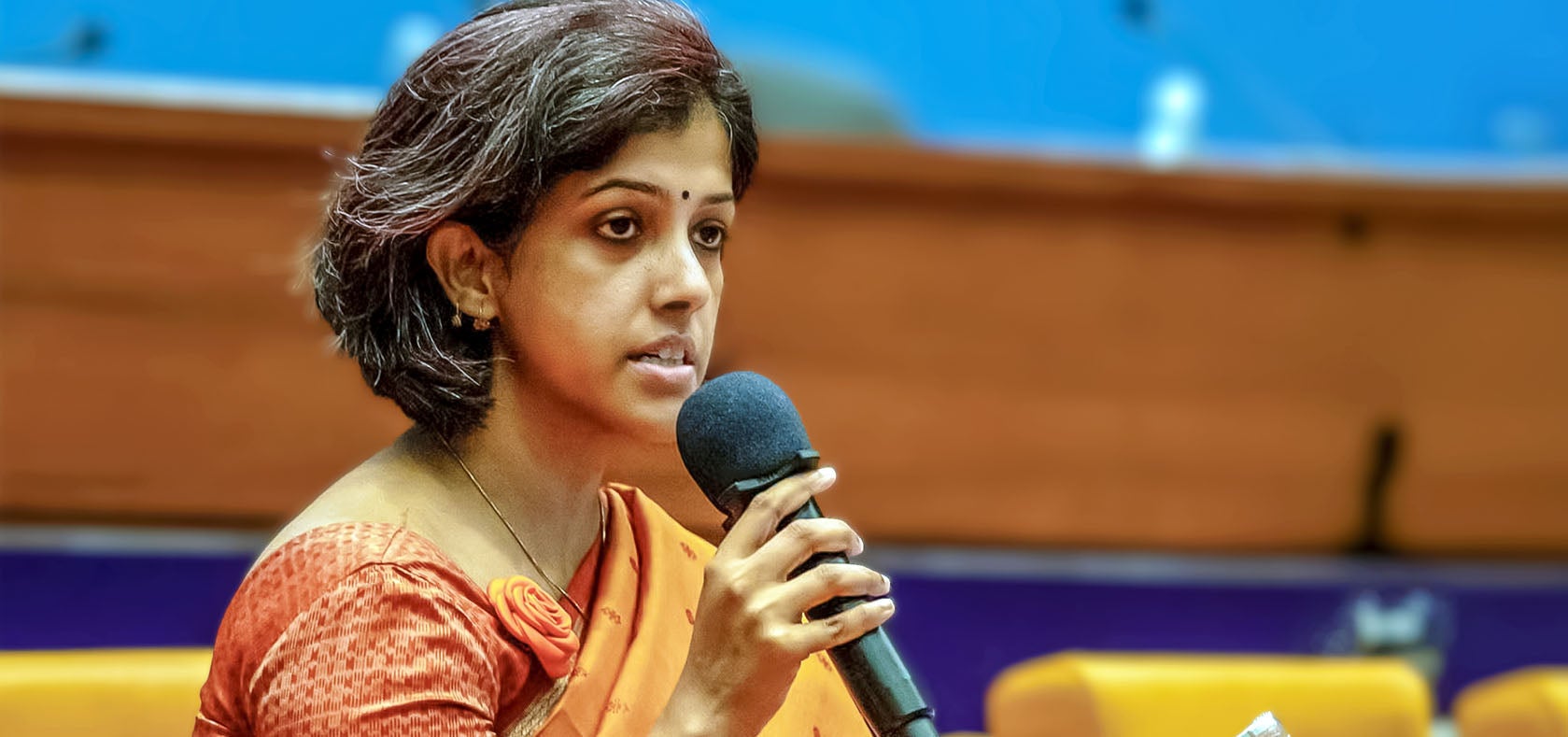#ForAllWomenandGirls is a rallying call for action on the 30th anniversary of the Beijing Declaration and Platform for Action. Pritha Chatterjee from Breakthrough, India, and talks about the importance of supporting feminist organizations and working with young people to change social norms.

Pritha Chatterjee, from Breakthrough, India, speaks at a roundtable during the Beijing+30 Review event in Bangkok, Thailand. Photo: UN Women/Ploy Phutpheng
Pritha Chatterjee leads global positioning at Breakthrough, a non-governmental organization in India focusing on preventing gender-based violence by bringing a generational shift in social and gender norms. By working with young people, between the ages of 11 and 25 years, the organization builds their aspiration, leadership, and negotiation skills to create change within communities.
What works to prevent violence against women and girls in local communities
“Violence and discrimination start early in the lives of girls, and it starts with the family and then the ‘school’ - where (girls) spend up to 6 hours a day,” says Chatterjee, speaking with UN Women during the Asia-Pacific Ministerial Conference, where regional leaders reviewed the progress on implementation of the Beijing Declaration and Platform for Action.
“Gender equality and quality education are inextricably linked,” says Chatterjee. “By working with young people and adolescents, we want to bring a generational shift to discriminatory norms.”
Breakthrough is advocating for creating a “gender transformative education system”, which is a whole-school approach, working with students, teachers, school administration and policy makers.
“In such a system, everyone would be safe, boys would not be favoured above girls, and girls would not be pulled out of school to work at home,” explains Chatterjee.
Chatterjee believes that such education systems can ultimately change social norms, reduce gender-based violence, and promote women’s leadership.
Breakthrough is a co-lead of the Generation Equality Action Coalition and has been a grantee of the UN Trust Fund to End Violence against Women, managed by UN Women. In 1996, the UN General Assembly resolution 50/166 called for the establishment of the UN Trust Fund in response to the commitments made in the Beijing Declaration and Platform for Action. By 2028, Breakthrough aims to reach 4 million adolescents across 35,000 schools in India.
“Another critical action that has been impactful in addressing violence against women and girls is using pop culture and storytelling to change gender norms and narratives,” Chatterjee adds. Breakthrough also works to build awareness among digital content creators and young advocates to create a “feminist internet”.
Small changes make big impacts in preventing violence against women and girls
Gender equality is a shared goal, and everyone has a role to play. Chatterjee narrates a story to show how empowering young people can make tangible differences in local communities.
“Anchal joined Breakthrough’s school-based intervention for adolescents and became a youth leader,” shares Chatterjee. “She learned to speak out against sexual harassment in public spaces – a taboo topic for many adolescents and young women. Her elder sister had never reported the incidents she experienced or witnessed, fearing that her education may be disrupted, or worse, that she would be blamed.”
“The first time Anchal raised the issue with her parents, her parents responded with disbelief and said, ‘your elder sister never faced such incidents… why are you being targeted?’”
“Equipped with the skills and knowledge gained through the Breakthrough programme, Anchal knew she had to do something. Together with her school group, Anchal approached local officials and was able to convince them to install lights and CCTV cameras in areas that women and girls identified as being unsafe.”
Consequentially, incidents of harassment reduced, and girls in her community are now more confident about speaking out against violence.
The role of civil society and feminist organizations in fulfilling the vision of the Beijing Platform for Action on ending violence against women
The Beijing Platform for Action recognized the power of feminist movements and civil society in shaping policy and supporting survivors. Research confirms that the presence of a strong and autonomous feminist movement is the most critical factor to drive change in ending violence against women and girls. Yet, in 2022, countries spent less than one percent of development aid to address gender-based violence, and only a fraction of that reached women’s organizations.
For Chatterjee, the issues that the Beijing Platform for Action committed to address are as relevant today as they were in 1995.
The role of civil society and feminist organizations is significant, she says, in “developing accountability mechanisms, amplifying and creating strategic messaging for different stakeholders to advance the agenda of gender equitable development, and advocating for feminist policies and gender transformational approaches with government and decision makers.”
“Diminishing funding for feminist networks and women’s’ rights organizations make it difficult to host in-person meetings and participate in regional and global processes,” she adds.
Chatterjee’s vision for all women and girls is powerful: “Let's create a world free of violence, where they would reach their full potential and not struggle just to fit in.”
